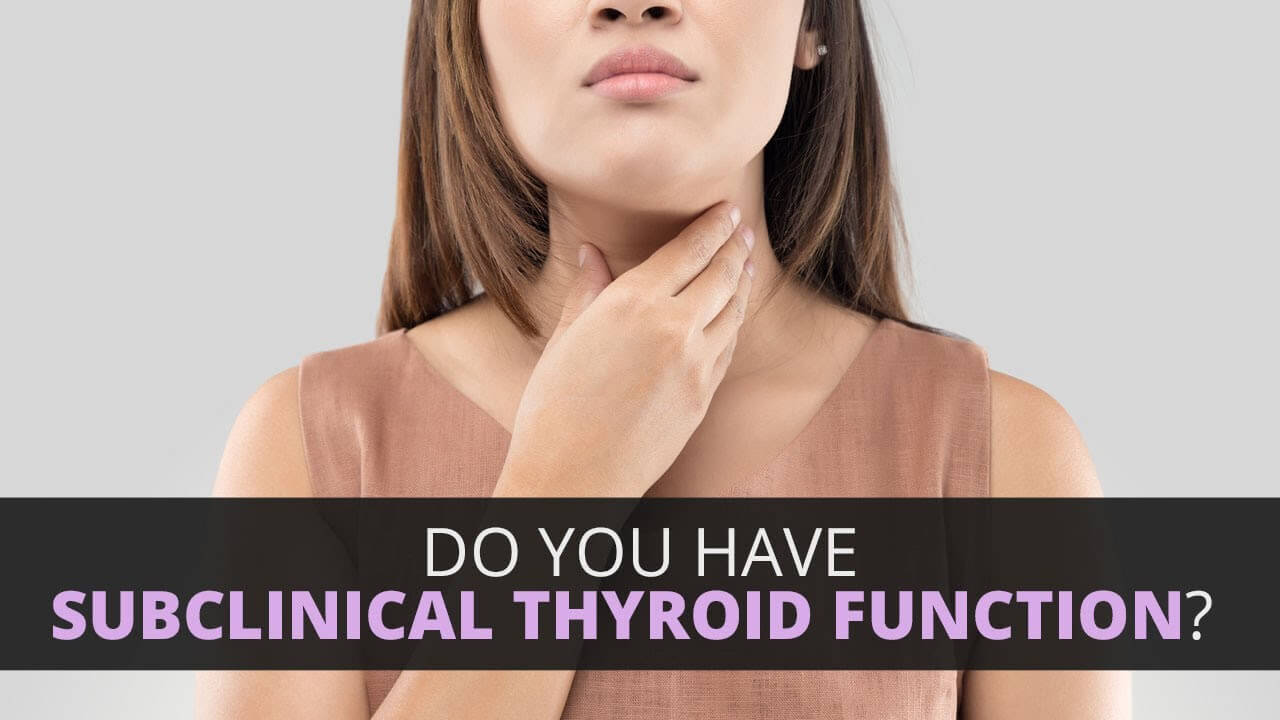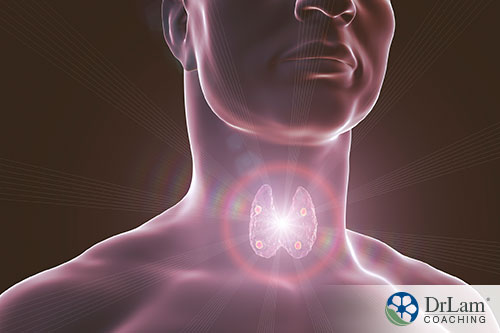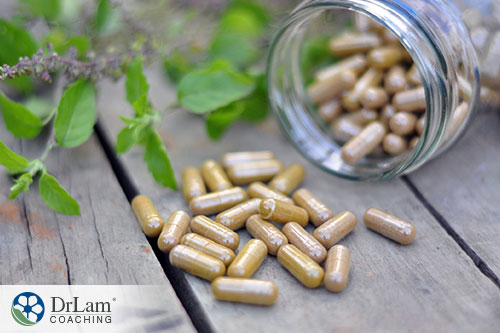
Estimates reveal that subclinical hypothyroidism affects between three to eight percent of the population. Adults and females also tend to be at a higher risk of developing the symptoms. The use of conventional medication can only provide temporary relief and comes with numerous difficult side effects. Understanding the source of this condition and adopting natural methods can help to successfully minimize the symptoms.
The thyroid is the largest endocrine gland in your body. It consists of two lobes connected in a butterfly shape, and they are wrapped around your windpipe. The main function of the thyroid is to absorb iodine from your diet and combine it with tyrosine to produce thyroid hormones. These hormones are responsible for the regulation of metabolism, growth, cardiovascular function, muscle control, digestive function, and brain development.
Subclinical hypothyroidism or subclinical thyroid disease is an early, mild form of hypothyroidism. In this case, your thyroid gland is unable to produce adequate thyroid hormones triiodothyronine (T3) and thyroxine (T4). The condition is referred to as subclinical, as only the serum level of the thyroid-stimulating hormone (TSH) - from the front of your pituitary gland- is slightly above the normal range. In people with this condition, blood tests show a normal level of peripheral thyroid hormone levels, but the TSH levels are mildly high.
So what does it mean if your TSH levels are high? The hypothalamus in your brain stimulates the pituitary gland for the production of TSH. When the level of thyroid hormones in your body drops too low, the TSH signals the thyroid gland for the secretion of more thyroid hormones. This means that high TSH levels are a sign that your body is working to secrete more thyroid hormones T3 and T4. These hormones are released into your bloodstream and are then transported through your body for the control of metabolism and energy consumption. This means that persons with subclinical thyroid disease and clinical hypothyroidism usually experience a slow metabolism.
The major concern about subclinical thyroid disease is that the condition may progress to clinical hypothyroidism. Clinical hypothyroidism can cause certain complications such as cognitive impairment, cardiovascular disease, and mood-related issues. People with subclinical thyroid disease experience various adverse symptoms which can decrease their quality of life. Some people might experience no symptoms at all or only mild symptoms. Some of the associated symptoms of subclinical hypothyroidism may include:

You should note that there’s a difference between hypothyroidism and hyperthyroidism. Hypothyroidism refers to underactive thyroid whereas hyperthyroidism refers to an overactive thyroid. These two thyroid conditions can often lead to opposite symptoms. Can you have a hypothyroid condition despite normal TSH levels? Yes, it is possible. A normal TSH level with a low T4 level may indicate hypothyroidism, whereas an elevated TSH level with a normal T4 level defines subclinical thyroid disease.
The contributing factors for subclinical thyroid disease are similar to those of hypothyroidism. During the condition, autoimmune thyroid disease or Hashimoto’s disease is the most common cause of elevated TSH. Studies show that over 80 percent of people with subclinical thyroid disease have antithyroid antibodies linked with Hashimoto’s. The other causes of subclinical hypothyroidism include:
Stress is a major contributing factor for various health disorders including hypothyroidism. The NeuroEndoMetabolic (NEM) Stress Response System of your body is a complex network of various organs and six circuits. These circuits include the Hormonal Circuit, which functions to help your body deal with stress. There is a pair of walnut-shaped adrenal glands located above your kidneys, which is also an important part of this stress response system. When a stressful situation arises, the NEM signals your adrenals through the Hypothalamus-Pituitary-Adrenal (HPA) axis, which then produces the anti-stress hormone, cortisol. However, when your body is constantly exposed to stress, the adrenals keep secreting additional cortisol. With time, this can leave your adrenal glands overburdened and they will no longer secrete adequate cortisol, which can lead to adrenal fatigue.
 When you frequently experience extreme fatigue along with other symptoms such as insomnia, anxiety, brain fog, and stubborn weight gain, then you could be dealing with Adrenal Fatigue Syndrome (AFS). The Hormonal Circuit of the NEM includes ovaries/testes, adrenal glands, and thyroid. Any imbalance in this circuit can lead to fatigue, a sluggish thyroid, reduced libido, hair loss, weight gain, infertility, and miscarriage.
When you frequently experience extreme fatigue along with other symptoms such as insomnia, anxiety, brain fog, and stubborn weight gain, then you could be dealing with Adrenal Fatigue Syndrome (AFS). The Hormonal Circuit of the NEM includes ovaries/testes, adrenal glands, and thyroid. Any imbalance in this circuit can lead to fatigue, a sluggish thyroid, reduced libido, hair loss, weight gain, infertility, and miscarriage.
Your adrenals and thyroid gland are hormonally linked through the hypothalamus and pituitary gland of your brain. An imbalanced Hormonal Circuit tends to cause a sluggish thyroid, which raises the risk of developing subclinical hypothyroidism. Most of the symptoms of this condition can be associated with AFS symptoms. Furthermore, subclinical hypothyroidism could also indicate the beginning of adrenal fatigue.
During adrenal fatigue, the adrenals are exhausted and are unable to function well. In an attempt to conserve energy, the adrenal glands slow down other bodily functions including metabolism. Your thyroid responds by reducing the secretion of T3 and T4 hormones, and your liver increases the secretion of thyroid-binding globulin (TBG) which prevents the thyroid hormones from getting released into the cells. In such cases, though symptoms of hypothyroidism might be present, lab tests may show relatively normal levels of T3 and T4. Therefore, it is important to emphasize restoring and healing your adrenals. This can be successfully done by following the adrenal fatigue protocols.
Blood tests showing high TSH hormone and normal peripheral thyroid hormones indicate subclinical hypothyroidism. But, thyroid disorders can be complex. Therefore, a complete hormone test is recommended to determine the best method for correcting the condition. At present, there is no cure for hypothyroidism. The good news is that certain natural remedies can help increase thyroid secretion. The combination of medication and lifestyle changes has been shown to help in clinical hypothyroidism. However, there are debates on whether subclinical thyroid disease can also be corrected in the same way. The symptoms of subclinical thyroid disease vary from one person to the next, affecting their quality of life differently. Therefore, researchers have different opinions on the best approach in dealing with the condition.
The exact limit of TSH levels remains a debate. At present, a TSH level of more than 10.0 mIU/L is the threshold where physicians would then prescribe medications like levothyroxine (even if your T3 and T4 are normal). On the other hand, in people with TSH levels less than 10.0 mIU/L, personalized therapy is recommended based on the patient’s symptoms, age, medical history, the risk for developing hypothyroidism, and other factors.
Research shows that around 80 percent of patients with subclinical hypothyroidism have a serum TSH of less than10 mIU/L. According to experts, the upper limit for normal, serum TSH levels needs to be within 3.0 to 5.0 mIU/L or possibly as low as 2.5 mIU/L. Observation shows that for subclinical thyroid disease, medication is not often the best approach. According to a 2007 meta-analysis involving fourteen randomized clinical trials, levothyroxine replacement therapy for subclinical thyroid disease did not improve survival or reduce cardiovascular risk. Furthermore, the therapy did not show any improvement in the quality of life such as improving anxiety, cognition or mood in comparison to those who did not undergo the treatment.
 When dealing with subclinical thyroid disease, there is no one-size-fits-all approach, as the symptoms vary from one person to the next. However, making alterations to your diet and lifestyle can be quite helpful in minimizing the symptoms. Since subclinical thyroid disease and adrenal fatigue share common symptoms, then adopting adrenal fatigue recovery protocols can help alleviate the symptoms.
When dealing with subclinical thyroid disease, there is no one-size-fits-all approach, as the symptoms vary from one person to the next. However, making alterations to your diet and lifestyle can be quite helpful in minimizing the symptoms. Since subclinical thyroid disease and adrenal fatigue share common symptoms, then adopting adrenal fatigue recovery protocols can help alleviate the symptoms.
Managing your stress levels is the key to preventing various health issues such as subclinical hypothyroidism. Chronic stress, over-exertion, and tight schedules combined with sleep deprivation can raise your level of the anti-stress hormone cortisol and adrenaline. These can be the driving factors for hormonal imbalance, thyroid disease, as well as adrenal fatigue. During this stage, the body tends to become weak. Overtraining can exert additional stress on your body. Therefore, in such cases, gentle workouts can help provide relief from the condition.
Regular restorative sleep is the cornerstone for the healthy functioning of the Hormonal Circuit, which is essential for recovering from thyroid disorders. Having adequate sleep helps maintain your circadian rhythm and a healthy balance of various hormones including thyroid, cortisol, serotonin, and melatonin.
Studies prove that a specialized dietary approach can help to naturally correct hypothyroidism. Most people with subclinical thyroid disease tend to have an autoimmune endocrine disorder due to the inflamed thyroid gland. This is often linked to various health issues including sensitivities, allergies, and chronic low-grade inflammation.
The first step in dealing with a thyroid disorder is to eliminate the source of the dysfunction. Some of these sources include chronic stress, nutrient deficiencies, and medication overuse which can generate an imbalance in the Hormonal Circuit. Eliminating foods that trigger inflammation and immune reactions have been shown to help manage the symptoms of hypothyroidism. Some of the foods that can trigger inflammation include dairy, gluten, refined oils, refined grains, synthetic additives, and added sugar. The key is to focus on foods that heal your GI tract, restore hormonal balance and reduce inflammation. Here’s a list of these nutrient-dense foods you should consume:
Vitamin deficiency is one of the factors for thyroid disorders. Certain supplements can prove helpful in reducing hypothyroid symptoms. Some of these supplements include:

However, there’s a word of caution. Some medications and supplements may generate adverse reactions, that should be avoided. Before you start taking supplements, you must consult with your healthcare professional. They will guide you to the right plan for your specific health needs.
In subclinical hypothyroidism or subclinical thyroid disease, your thyroid gland is unable to produce adequate thyroid hormones. This affects several important body functions such as metabolism, growth, cardiovascular function, muscle control, digestive function, and brain development. Subclinical thyroid disease can also indicate the beginning of adrenal fatigue. The adrenal glands and thyroid are hormonally linked through the hypothalamus and pituitary gland of your brain. So restoring your adrenals can help alleviate the symptoms of the condition. Following adrenal fatigue recovery protocols and a strategic diet plan are the key steps in naturally correcting thyroid disorders. If you would like to know more about subclinical hypothyroidism or subclinical thyroid disease, the team at Dr. Lam Coaching can help. We offer a free** no-obligation phone consultation at +1 (626) 571-1234 where we will privately discuss any issues you may have or click here to ask us a question through our Ask The Doctor system.
Studies show that utilizing a special dietary approach can significantly alleviate symptoms of subclinical hypothyroidism. People with this condition need to be careful with their diets. They should consider avoiding soy products, caffeine, millet, gluten, fatty foods, cruciferous vegetables, and some meats.
